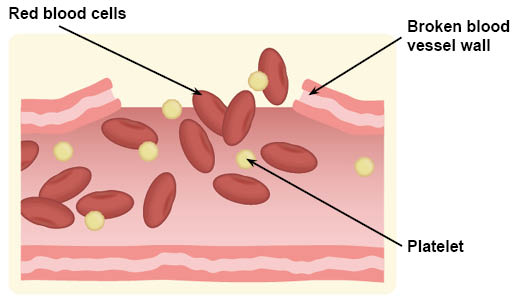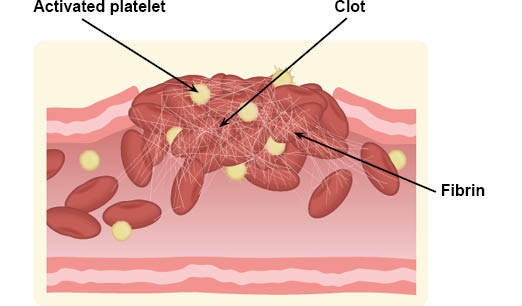Having a platelet function test
Information for patients from the Haemostasis and Thrombosis Laboratory
This leaflet is for patients coming to the Kent Haemophilia and Thrombosis Centre for platelet function testing.
It will guide you through platelet function testing, explaining what these tests are and why they are being done, how you should prepare for the tests, what you can expect on the day itself, and the side effects that you may have after the test.
What are platelets? And what do they do?
Platelets are small cell fragments that circulate in your blood. When a blood vessel is damaged and blood leaks out, platelets rush to the site of the bleeding and form a temporary plug.
Platelets work by:
sticking to the injured blood vessel wall to block the leak
releasing chemicals that make more platelets gather at the site of the injury; and
stick together so they can form a plug.
The diagram shows how the plug is formed to stop the bleeding. Fibrin is then made to make the plug a more stable blood clot.
-
 Damaged blood vessel, with red blood cells leaking out
Damaged blood vessel, with red blood cells leaking out -
 Platelets at the broken blood vessel wall, plugging the opening
Platelets at the broken blood vessel wall, plugging the opening
What are platelet function disorders?
Platelet function disorders are conditions where your platelets do not work the way they should, which means there is an increased risk of you bleeding or bruising. Since the platelet plug does not form properly, bleeding can continue for longer. You should not bleed any faster, however you may bleed for longer than expected.
Having a platelet function disorder should not affect your everyday life. Most of the bleeding problems tend to happen after an injury, surgery, or dental treatment.
How do you get a platelet function disorder?
Platelet function disorders are a group of inherited conditions, which means that you are born with them. Both men and women can inherit them from their parents. One set of our genes is inherited from our mother and the other set from our father. Both parents must carry the defective gene and pass it on, for their child to have a severe platelet function disorder.
What are platelet function tests?
Platelet function tests are specialist tests done in a laboratory. The tests look to see how well your platelets are performing in the blood clotting system (also called the coagulation system).
Why have I been referred for platelet function tests?
You have been referred for platelet function testing by a consultant haematologist, as they suspect that your platelets are not working properly. This is usually because either you, or a family member has a history of abnormal bruising and / or bleeding.
If a problem with your platelets is found, this can help us give you the correct advice about managing your symptoms and what treatment is available to you.
Where will I have my test?
You will be given an appointment to come to the Kent Haemophilia and Thrombosis Centre at Kent and Canterbury Hospital, to have your blood samples taken. This appointment is usually on the same day as your appointment with the consultant haematologist. It is typically at 9am, unless we need you to stop taking any medications before your test (see How do I prepare for my test? below).
Car park 3 on the Kent and Canterbury Hospital site is outside of the Kent Haemophilia and Thrombosis Centre, with step free access from the car park to the centre.
If you have any questions or concerns about your test, please speak to a member of hospital staff. Remember you have the right to withdraw your consent for treatment at any time.
How do I prepare for my test?
Platelet function testing is very sensitive to anything that can affect how platelets work. This includes certain foods, drinks, health supplements, and medications (including both prescription medication and over-the-counter medication). Therefore it is important for us to rule out these effects well before your platelet function test is carried out.
Medications and supplements
Please tell your haematology doctor which medications and supplements you are taking. Your doctor will tell you if you need to stop any medications before your test. Do not stop taking any of your medications before speaking to your doctor in the Blood Clotting Clinic first.
The list of medications that may affect platelet function tests is very long, but some of the most common drugs include:
drugs used to treat or prevent heart disease or stroke, such as aspirin, clopidogrel, and persantin.
anti-inflammatory drugs, such as ibuprofen, naproxen, and indomethacin.
heart and blood pressure drugs.
some antibiotics.
some antihistamines.
some antidepressants.
Most patients will be asked to stop taking non-essential prescription medication, and to avoid taking over-the-counter medication for at least two weeks before their platelet function test. Do not stop taking any of your medications before speaking to your doctor in the Blood Clotting Clinic first.
Food and drinks
Food and drinks to avoid for 48 hours before platelet function testing.
Alcohol
Fish oils
Garlic
Ginger
Chinese black tree fungus
Pineapple.
If you have any questions, please contact the Kent Haemophilia and Thrombosis Centre and speak to a member of staff.
What happens on the day of my test?
On the day of your blood test, please come to the reception desk at the Kent Haemophilia and Thrombosis Centre to book in. You will be shown to the waiting room, before a member of staff takes you to a clinic room for your blood test.
You will be asked what medication you have taken, and what you have had to eat and drink that day, so we can complete a pre-blood test questionnaire. This information is very important, as it helps us read your test results correctly.
The member of staff will explain the test to you and ask for your consent to have the blood sample taken. Please ask any questions you may have. Remember you have the right to withdraw your consent for treatment at any time.
The blood sample is exactly the same as for a normal blood test, except that slightly more blood will be taken. The blood sample will be taken by either a specialist haemophilia nurse or a healthcare assistant.
When will I get my results?
Your blood sample will be taken to the Haemostasis and Thrombosis Laboratory, where the platelet function testing is performed by laboratory scientists. Although most of the platelet function tests are done on the same day as your blood test, some parts of the test are done in laboratories outside of East Kent. It may take three to six weeks for all your results to come back.
Your results will be discussed with you at your follow-up clinic appointment. You will be contacted to arrange this appointment after your platelet function test.
Are there any risks to having a platelet function test?
It is very rare for blood tests to result in serious complications. However, there is a very small possibility of complications, which include the following.
Infection at the injection site.
Excessive bleeding.
Nerve irritation / pain.
A haematoma forms (this is a collection of blood under the skin, similar to a bruise which clots to form a solid lump).
Some people can feel dizzy and faint during the blood test, particularly if they are afraid of needles. If this has happened to you in the past, tell the person carrying out the test so they are aware and can help you feel more comfortable.
What if I have any questions or concerns when I get home?
If you have any questions about platelet function testing, your appointment, or what medication may interfere with your test, please contact the Centre.
Kent Haemophilia and Thrombosis Centre
Telephone: 01227 783157
Email
Office hours: 9am to 5pm, Monday to Friday. If your question cannot be answered immediately, then someone will call you back.
Further information
The following web sites give further information on platelet function disorders and platelet function testing.